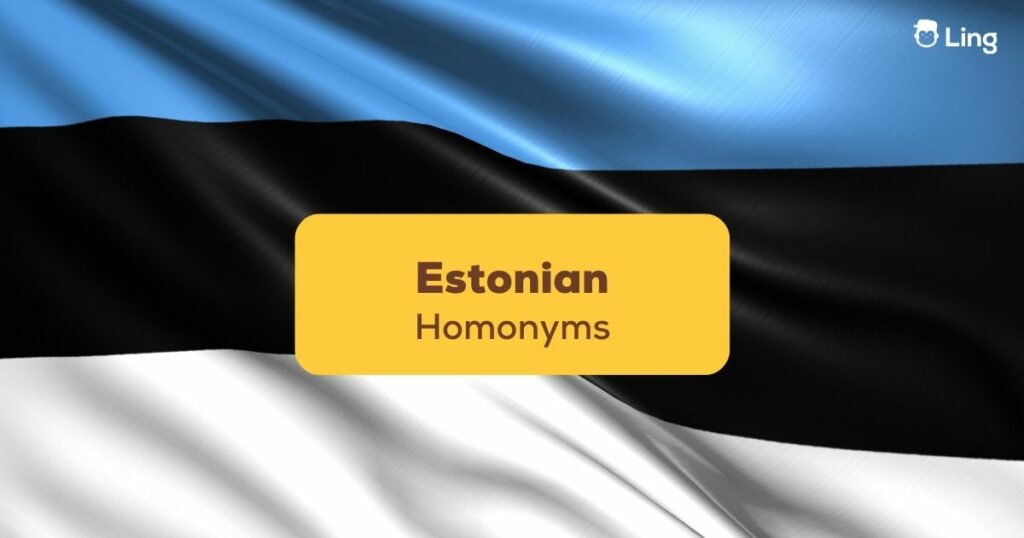Getting To Grips With Estonian Homonyms
Learning a handful of Estonian homonyms is a great way to boost your grip on a tricky language. If, like me, you can’t quite remember the difference between a homonym, a palindrome, and an onomatopoeia – although you are pretty sure you might have been told when at school – well, I’ve looked it up for us. A homonym is, according to the Cambridge Dictionary: “A word that sounds the same or is spelled the same as another word but has a different meaning: “No” and “know” are homonyms. “Bow” (= bend at the waist) and “bow” (= weapon) are also homonyms.”
With that cleared up, let’s delve into the often humorous world of Estonian homonyms.
English And Estonian Homonyms
As in many languages, there are words in Estonian that foreigners will read and immediately assume they mean the same in their own language. It’s a perfectly natural and instinctive thing to do until you think again and realise that it is very rarely the case. The laws of probability mean that any language using the Latin-script alphabet is bound to have at least a few words that are spelled the same as words in another language but have completely different meanings.
This being said, there is quite a list when it comes to Estonian words spelled the same as English words but which mean something completely different in translation and are indeed untranslatable.
Lost In Translation
Below is a list of Estonian words that have the same spelling as English words although they differ when spoken and have very different meanings in translation.
| Estonian | English |
| all | down/below |
| arm | a scar, love |
| hall | grey |
| hell | delicate, sensitive |
| hull | crazy |
| hunt | wolf |
| keel | tongue, language |
| keep | cape |
| last | load |
| leer | a rite of confirmation |
| lust | joy, delight, enthusiasm |
| male | chess |
| part | duck |
| pink | bench |
| purse | outburst, eruption, gush |
| rant | edge, rim, border |
| sale | slender |
| seep | soap |
| side | a connection |
| silt | sign/billboard |
| vein | wine |
| vend | brother |
The last two on our list of words that look the same as English words but have completely different meanings vein and vend are pretty much identical in sound in both Estonian and English.

Estonian Homographs
A homograph is a particular type of homonym where the words are spelled the same but has different meanings depending on how the word is pronounced. For example, in Estonia, the word tall can mean lamb or kid when pronounced in a certain way, and stall or stable with a different inflection. The same goes for the word palk, which means log or salary depending on how it is pronounced.
Other Estonian words that share the same pronunciation and/or spelling include ass, which can mean a loop of string or a meadow. puur is a drill or a cage and reis can either mean your thigh or going on a journey. Tint can either mean smelt or ink. Luckily, most of the homonyms we have looked at have definitions that shouldn’t get mixed up because the context will probably suggest which version of the word you are attempting to convey.
Homonüümihuumor, Or Homonym Humour
If you are visiting the suburb of Mähe in the Estonian capital city of Tallinn you might stumble across a confusing road sign or two. Jasmiini (jasmine) tee and its neighbour Kummeli (camomile) tee are not, as you might at first expect, the names of some rather quaint tea shops in which to enjoy a refreshing cuppa but are actually the names of streets. In Estonian tee is spelled differently and means road. Also to be found nearby are Vabarna (vaarika – raspberry) tee and Nurmenuku (cowslip, primula) tee.
Even the suburb of Mähe has an amusing joke name. Etymologists will probably claim that the derivation of the name Mähe comes from the Estonian mäe, or hill, and not from the word mähe which many Estonians might take to mean diaper! This could prove tricky when it comes to selling your house.
Beware The Menu
As if street names weren’t enough of a minefield, road in Estonian means to prepare food or culinary dishes. If you are dining out with new friends in Estonia be prepared to find eelroad on the menu. Not, as you first may think, a place where slithery creatures dwell but a list of tasty starters as the phrase literally translates as introductory dishes.

Estonian Terms With English Homophones
Hell Hunt
At first glance this phrase can’t mean anything good, can it? In fact, Hell Hunt is not the hideous infernal cat-and-mouse situation you never want to find yourself in but translates as the much more benign Gentle Wolf.
Pure Mind
Another phrase that is something very different in translation, Pure Mind does not mean somebody who thinks lovely thoughts but translates as Bite Me. Not in a playful way either, but in as the wolf mentioned above might do if he stopped being gentle and turned to his darker side.
Learn More Marvelous Estonian Homonyms With Ling
When visiting a new country like Estonia it is always a great idea to brush up on at least a few new words and phrases to make communication when you get there not only easier but more enjoyable. By carrying the Ling App with you wherever you go you will be able to make new friends, book a hotel, order food, and go shopping with the confidence that you will have all the vocab needed at your fingertips.
Learning Estonian with Ling is made fun and easy because we use interactive games and quizzes to boost your linguistic skills in a way more conventional apps do not. Why not give it a try and download the Ling App now at Google Play or App Store?


































































